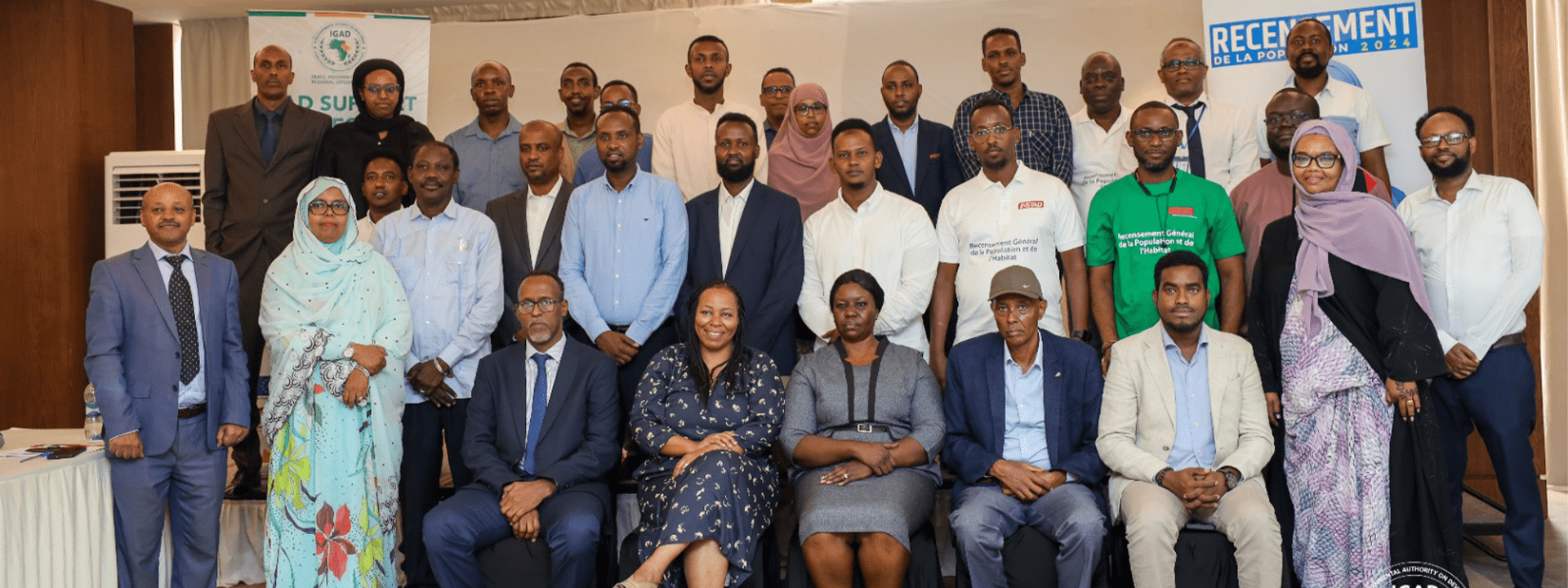May 3, 2024 (DJIBOUTI CITY, Djibouti): Officials from the Somalia National Bureau of Statistics (SNBS) have concluded a 4-day learning visit to the National Institute of Statistics of Djibouti (INSTAD) in conducting and managing the population census.
The IGAD Secretariat facilitated knowledge sharing and exchange visit which took place April 30th – May 3rd 2024 brought together officials from the Somalia National Bureau of Statistics and other officials from the Ministries of Planning Investment and Economic Development in the regional states across the Federal Government of Somalia who are in the planning phase for the upcoming Somali Population and Housing Census (SPHC), the first in over 50 years.
Djibouti is currently conducting the 3rd country-wide Population and Housing census and has deployed new information and communication technologies as well as geospatial technologies for both census cartography and population counts with support from partners.
Representing the Director, Health and Social Development at IGAD Secretariat, Mme Fathia Alwan during workshop, the Head of Social Development, Dr. Victoria Anib underscored the pivotal role of censuses in establishing population dynamics, socio-economic trends, and development needs.
She highlighted that censuses provide the foundation upon which informed decisions, evidence-based policies, and effective resource allocation are built especially helping to identify vulnerable populations and target interventions accordingly.
“Studying methodologies, technologies, and best practices will enable us to improve our processes and increase the accuracy and reliability of our data, including migration and displacement statistics.”
The Director General of the Institute of Statistics of Djibouti (INSTAD) Dr. Ibrahim Abdi Hadi, welcomed the Somalia Statistics team imploring that learning visits are key in preparation and overcoming challenges in the implementation phase. He said that Djibouti had invested significantly in human, material, technological and financial resources to ensure seamless census process to which the Somali delegation will interact with in real time.
The learning sessions were a blend of workshop presentations with technical staff and field visits to the regions of Arta and Djibouti City to interact with the field staff. In the field visits, the Somali delegation accompanied field enumerators as they captured data from the local population.
They witnessed the deployment of technology, personnel and real time data capture of the demographic and social economic characteristics of the population including migrants and among others. The team also interacted with enumerators establishing the technical specifications of the equipment and logistics of the census and highlighting different challenges including the deployment of migration and displacement modules.
Ms. Shukri Yusuf, the SNBS Finance Specialist appreciated the learning visit especially information on the planning and mobilisation of funds for the entire exercise. She said that the team would use the practical elements to establish timely structures and proposals to raise the necessary funds for the Somali census.
Dr. Abdi Ali, the Census Director at the Somalia National Bureau of Statistics commended the Government of Djibouti for agreeing to host the Somali delegation and involve them in the process for a first-hand experience.
“We were able to witness the methodology, understand the census journey, the preparation, had the opportunity to observe the real time data collection, the deployment of technology and how to track internal and external migrants especially pastoral populations and displaced persons,” said Dr. Ali.
The 2024 Djibouti Population and Housing Census Djibouti comes 15 years since the 2009 census which estimated the population at 516,055 people of which 76% resided within Djibouti City. Djibouti had last conducted a population and housing census in 1983.
The GIZ Team Leader for the Strengthening IGAD Migration Policy Implementation (SIMPI) Project, Ms. Kokebe Hailegabriel applauded the efforts of IGAD fostering strong collaboration on migration data and statistics between national governments and regional working groups.
“This unique aspect has established a network of statistics experts across member states, which strengthens regional data collection and analysis,” said Ms. Kokebe. The learning visit was supported by financing from the SIMPI Project.

